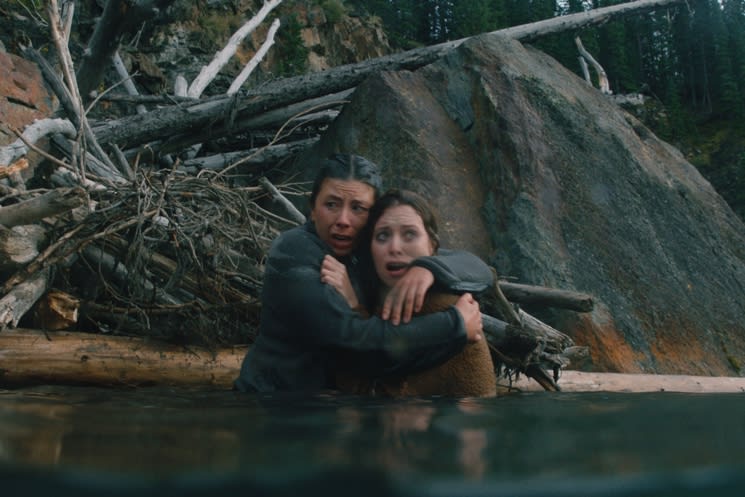Dark Nature's premise is enticing: a horror/thriller that follows a therapy group on a retreat in the Canadian Rockies. Calgary-based Métis filmmaker Berkley Brady's directorial debut starts out strong with a disturbing scene in which Joy's (Hannah Emily Anderson) partner, Derek, strangles her and kills her dog. Months after escaping the abusive relationship, Joy reluctantly joins her friend, Carmen (Madison Walsh), on the mountain retreat along with two other women. The trip is meant to be a healing journey, exposing them to challenges in nature so that they can better confront the trauma from their pasts.
From the outset, something isn't quite right. Joy constantly feels like she's being watched, sensing that Derek might be lurking in the shadows, following her. She is often haunted by flashbacks from the violent assault, and her anxiety is only exacerbated by the sense of unease in venturing deep into the Canadian wilderness with a group she doesn't fully trust. The other women reassure her that her fears are just the result of her trauma, that it's all in her head, until they realize they may also be in real danger.
With an all-female cast and plenty of potential as a story of empowerment, the film fails to explore these themes in a nuanced way or set itself apart from the many other horror films centred around trauma. So much of the film is dedicated to questioning Joy's paranoia and setting up tension around the potential threat — is it Derek or is it something supernatural? — that it relies mainly on brief and surface-level dialogue to offer any insight into the lives of the women and the group's dynamics.
Likewise, the therapist leading the group, Dr. Dunnley (Kyra Harper), is set up to be one of the more intriguing roles in the film, but we learn very little about her background and motivations for her unusual methods. The film suffers from a lack of pacing, and falls under familiar tropes without offering enough thrills to justify them. Perhaps most frustratingly, the film hardly weaves together the lives and traumas of the characters it wants to portray with the terror they face in the forest, leaving many questions unanswered.
Despite this, and a bothersome overuse of dolly zooms, the film captures just how eerie and stunning a trip deep into the Canadian wilderness with a bunch of strangers can be. Across the board, the acting is solid. As Joy, Anderson renders moments of panic and paranoia believable and refocuses the plot when weaker pieces of dialogue start to distract.
In the earlier acts of the film, Brady makes viewers question what is real or not alongside Joy, especially during the moody flashbacks, leaving us in an encouraging suspense. It's mostly towards the end of the film that it loses its allure and collapses into ridiculousness, while also being a tad boring.
Though the film shows some promise for Brady's future work, Dark Nature's attempts to make an affecting exploration of trauma — or at the very least give us a good scare — leave much to be desired.
(Filmoption International)From the outset, something isn't quite right. Joy constantly feels like she's being watched, sensing that Derek might be lurking in the shadows, following her. She is often haunted by flashbacks from the violent assault, and her anxiety is only exacerbated by the sense of unease in venturing deep into the Canadian wilderness with a group she doesn't fully trust. The other women reassure her that her fears are just the result of her trauma, that it's all in her head, until they realize they may also be in real danger.
With an all-female cast and plenty of potential as a story of empowerment, the film fails to explore these themes in a nuanced way or set itself apart from the many other horror films centred around trauma. So much of the film is dedicated to questioning Joy's paranoia and setting up tension around the potential threat — is it Derek or is it something supernatural? — that it relies mainly on brief and surface-level dialogue to offer any insight into the lives of the women and the group's dynamics.
Likewise, the therapist leading the group, Dr. Dunnley (Kyra Harper), is set up to be one of the more intriguing roles in the film, but we learn very little about her background and motivations for her unusual methods. The film suffers from a lack of pacing, and falls under familiar tropes without offering enough thrills to justify them. Perhaps most frustratingly, the film hardly weaves together the lives and traumas of the characters it wants to portray with the terror they face in the forest, leaving many questions unanswered.
Despite this, and a bothersome overuse of dolly zooms, the film captures just how eerie and stunning a trip deep into the Canadian wilderness with a bunch of strangers can be. Across the board, the acting is solid. As Joy, Anderson renders moments of panic and paranoia believable and refocuses the plot when weaker pieces of dialogue start to distract.
In the earlier acts of the film, Brady makes viewers question what is real or not alongside Joy, especially during the moody flashbacks, leaving us in an encouraging suspense. It's mostly towards the end of the film that it loses its allure and collapses into ridiculousness, while also being a tad boring.
Though the film shows some promise for Brady's future work, Dark Nature's attempts to make an affecting exploration of trauma — or at the very least give us a good scare — leave much to be desired.
